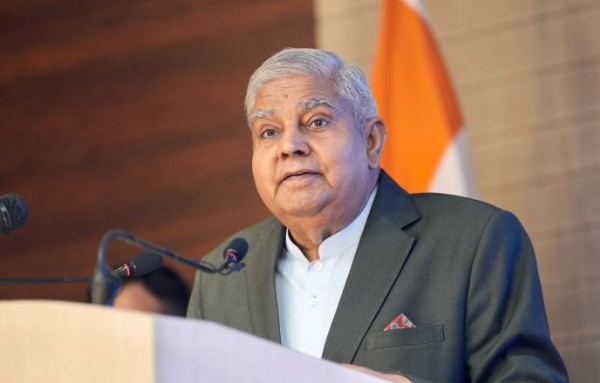"India does not need lessons from any country on rule of law": Vice President after US, UN, Germany peddle in India's internal affairs
Vice-President Jagdeep Dhankhar, in response to recent comments by Germany, the UN and the US regarding the arrest of Delhi Chief Minister Arvind Kejriwal and the implementation of Citizenship (Amendment) Act 2019, asserted that India has a robust judicial system and does not require lessons on the rule of law from any country.
Total Views |
New Delhi, Mar 30: After the United States of America, United Nations and Germany spoke about the Citizenship (Amendment) Act 2019 and Arvind Kejriwal's arrest, Vice President Jagdeep Dhankhar on Friday asserted that India is a democratic nation with a robust judicial system that any individual or any group can not compromise. Further, he described Indian democracy as unique and said that India does not need lessons from anyone on the rule of law.

This statement as the Vice President addressed the 70th Founders’ Day celebrations of the Indian Institute of Public Administration (IIPA) in New Delhi.
“Recently, people are telling us about the rule of law. One country in Europe, a developed democracy, they need to think within. They need to attend to their own affairs," Dhankar took a dig for remarks about India's internal affairs.
"Equality before law is a ‘new norm’ in India today and the law is holding those accountable who thought themselves as beyond law. But what do we see? The moment law takes its course, they take to the streets, high decibel debates, camouflaging the culpability of the worst nature by human rights. This is happening under our nose,” Dhankhar said.
India is a democracy with a robust judicial system.
— Vice President of India (@VPIndia) March 29, 2024
This can't be compromised by any individual or any group.
India does not need lessons from anyone on rule of law. @iipa9 #IIPA pic.twitter.com/RgnuIV8dPM
“Describing the Indian judicial system as robust, pro-people and independent, he questioned “What is justification for a person or an institution or an organisation to take to streets when law is set in motion?”
He criticized opposition protests following Kejriwal’s arrest, asserting that India’s rise is met with challenges both domestically and externally.
Dhankhar asked, “Can people orchestrate in complaining mode, a pernicious tendency to get away from rule of law? How can one engaging in transgression of law play the victim card?”
Questioning the tendency to target our institutions, the Vice President asked, “If a group of people without being registered or recognised party act as a political party, what do we do? They are not accountable, they get traction. We must rise above it.”
Further advocating India’s case for the United Nations Security Council seat, he said that the institution the of the United Nations cannot be as protective and effective unless you have representation of a country like India that has the unique position of being the only country in the world to have constitutionally structured democracy at all levels.

